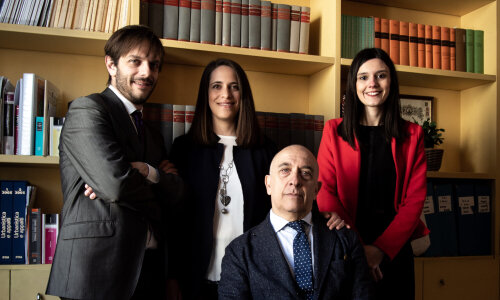Best Divorce & Separation Lawyers in Modena
Share your needs with us, get contacted by law firms.
Free. Takes 2 min.
Free Guide to Hiring a Family Lawyer
List of the best lawyers in Modena, Italy
About Divorce & Separation Law in Modena, Italy
Divorce and separation law in Modena, Italy, follows the broader Italian legal framework, with certain local procedures and resources available to residents. Divorce (“divorzio”) and separation (“separazione”) are distinct legal processes in Italy. Separation allows spouses to live apart and regulate child custody, maintenance, and property issues without ending the legal marriage. Divorce officially dissolves the marriage, allowing former spouses to remarry. Both processes require judicial involvement, and can be pursued jointly (by agreement) or unilaterally (contentious).
Why You May Need a Lawyer
Seeking legal advice from a qualified family lawyer in Modena can be crucial in several divorce or separation scenarios:
- Disagreements over child custody, visitation, or parental authority
- Contention about division of marital assets or property
- Complexities involving international aspects (e.g., one spouse is not Italian)
- Negotiating or contesting spousal and child support (alimony and maintenance)
- Ensuring protection from domestic violence or abusive situations
- Understanding and complying with the local court procedures
- Drafting or reviewing legal agreements to ensure your rights are protected
A lawyer helps explain your rights, represents your interests in court or in negotiations, and guides you through the often complex paperwork and legal steps.
Local Laws Overview
Key aspects of divorce and separation in Modena, Italy, are governed by the Italian Civil Code and national legislation, but awareness of local practices is important:
- Types of Separation: Italy allows for consensual separation (by agreement) or judicial separation (when spouses disagree).
- Waiting Periods: After legal separation, a waiting period (typically 6-12 months, depending on circumstances) is required before a divorce can be granted.
- Divorce Procedure: Divorce can be by mutual consent or contentious. If both parties agree, the process is usually faster and cheaper.
- Child Custody: The law generally favors shared custody, prioritizing the child’s interests. Local courts have discretion based on each case.
- Alimony and Child Support: The court examines incomes, needs, and standard of living to determine maintenance obligations.
- Property Division: Assets and debts accumulated during marriage are divided based on the matrimonial property regime (“comunione” or “separazione dei beni”).
- Alternative Dispute Resolution: Mediation services are available in Modena to help couples resolve issues amicably.
- Local Court: The Tribunal of Modena (Tribunale di Modena) handles such cases.
Frequently Asked Questions
What is the difference between separation and divorce in Modena, Italy?
Separation allows spouses to live apart but does not end the marriage, while divorce legally dissolves the marriage and allows both parties to remarry.
How long does it take to get a divorce in Modena?
After a legal separation, you must wait at least 6 months (for consensual separation) or 12 months (for judicial separation) before you can file for divorce. The actual duration depends on the complexity of your case and court schedules.
Can we divorce by mutual agreement?
Yes, if both spouses agree on key issues (children, property, support), you can file for consensual divorce, which is generally faster and simpler.
What happens to our children during a separation or divorce?
Italian law prioritizes the best interests of the child. Courts often grant joint custody, ensuring contact with both parents unless one is unfit.
How is property divided in a divorce?
Property acquired during marriage is divided according to the matrimonial regime chosen (“comunione dei beni” or “separazione dei beni”). If the default “comunione dei beni” applies, assets are split equally, unless otherwise agreed.
Who pays child or spousal support?
The court may order one spouse to pay maintenance (alimony) to the other and/or child support, based on incomes, needs, and lifestyle maintained during marriage.
Do I need to go to court for separation or divorce?
Yes, all legal separations and divorces in Modena are subject to judicial approval, even if by mutual agreement. In some cases, simplified procedures before the mayor or via mediation are possible.
Can I get divorced in Modena if I or my spouse are foreign nationals?
Yes, but there can be additional requirements. The court in Modena can have jurisdiction if you or your spouse reside there, and your lawyer can help navigate international aspects.
Is mediation available or required during separation or divorce?
Mediation is available to help resolve disputes amicably, often encouraged by local courts. It may be required in cases involving children.
What if there is domestic violence?
If there is abuse or violence, you should contact local law enforcement or a lawyer immediately. The court can issue protective measures and prioritize safety in custody decisions.
Additional Resources
Here are some helpful resources in Modena:
- Tribunal of Modena (Tribunale di Modena): The main court handling separation and divorce proceedings.
- Local Bar Association (Ordine degli Avvocati di Modena): For finding qualified family law lawyers.
- Mediation Centers (Centri di Mediazione Familiare): Provide professional mediation services for separating couples.
- Social Services (Servizi Sociali): Offer support to families and children during separation.
- Anti-violence Centers (Centri Antiviolenza): Assist individuals affected by domestic violence.
- Comune di Modena: Provides information and some administrative services for marital status changes.
Next Steps
If you are considering separation or divorce in Modena, Italy:
- Consider your specific circumstances and what issues (children, property, support) may arise.
- Gather all relevant documents, such as marriage certificate, financial statements, and identification.
- Seek legal advice from a qualified family law lawyer in Modena to understand your rights and possible options.
- If possible, attempt to negotiate or mediate with your spouse to reach mutually agreeable solutions.
- If agreement is not possible, your lawyer will help you initiate judicial proceedings in the Tribunal of Modena.
- Stay informed and make use of local resources such as social services or counseling if needed.
Remember, every situation is unique. Engaging a local legal professional early on ensures your interests are protected, and helps you navigate the process with clarity and confidence.
Lawzana helps you find the best lawyers and law firms in Modena through a curated and pre-screened list of qualified legal professionals. Our platform offers rankings and detailed profiles of attorneys and law firms, allowing you to compare based on practice areas, including Divorce & Separation, experience, and client feedback.
Each profile includes a description of the firm's areas of practice, client reviews, team members and partners, year of establishment, spoken languages, office locations, contact information, social media presence, and any published articles or resources. Most firms on our platform speak English and are experienced in both local and international legal matters.
Get a quote from top-rated law firms in Modena, Italy — quickly, securely, and without unnecessary hassle.
Disclaimer:
The information provided on this page is for general informational purposes only and does not constitute legal advice. While we strive to ensure the accuracy and relevance of the content, legal information may change over time, and interpretations of the law can vary. You should always consult with a qualified legal professional for advice specific to your situation.
We disclaim all liability for actions taken or not taken based on the content of this page. If you believe any information is incorrect or outdated, please contact us, and we will review and update it where appropriate.










